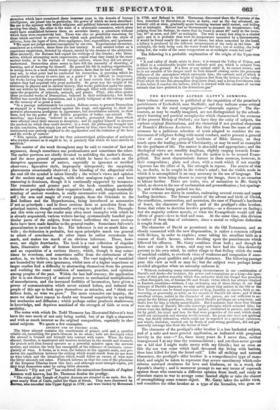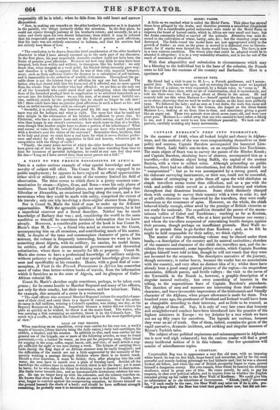THE REVEREND ALFRED GATTT'S SERMONS.
Tans volume of sermons is published at the requisition of the preacher's parishioners of Ecelesfield, near Sheffield ; and they indicate some critical perception in the rural congregation—" abnormis sapiens." The dis- courses, as may be readily imagined, are not distinguished by the school- men's learning and poetical metaphysics which characterized the sermons of the present Bishop of Oxford ; nor have they the unity of subject, the various original illustrations, and the rhetorical if not poetical eloquence of Trench's Hulsean Lectures. But they differ from the mass of plain sermons by a judicious selection of texts adapted to combine the en- forcement of religions feeling with moral conduct, and to present a general view of some of the principal incidents of Bible history, as they touch upon the leading points of Christianity, or may be used as examples for the guidance of life. The matter is also solid and appropriate; and the theological views are sensibly Anglican, slightly verging towards Evan- gelism, though we do not know that the author is to be termed Evan- gelical. The most characteristic feature in these sermons, however, is their composition; plain and close, with a truth which if not exactly vigorous has the effect of it, like strength in repose. The source of this is, no doubt, to be sought in the writer's mind ; but the visible mode in which it is accomplished is an easy accuracy in the use of language. The appropriate term being chosen to convey the image, there is no occasion to labour further. There are traits, too, of animation in Mr. Gatty's mind, as shown in the use of exclamation and personification ; but sparing- ly, and without being pushed too far.
The sermons are thirty in number, embracing several events and many leading doctrines. The former consist of the advent and birth of Christ, the crucifixion, resurrection, and ascension, the case of Pharaoh's hardness of heart, the character of David, and of the prodigal's elder brother.
Some that relate to doctrine involve practice,—as a discourse on fasting; but the majority enforce morals, or what the Evangelicals would call the effects of grace—love to God and man. At the same time, this division is rather of form than of substance, since a moral or religious deduction is sought from all.
The character of David as prominent in the Old Testament, and so closely connected with the new dispensation, is rather a common subject with divines, in order to explain ; some taking his steadfast faith as reason of God's favour, others dwelling upon the punishments which followed his offences. Mr. Gatty combines them both ; and though he does not state it in terms, and may not have had the idea distinctly present to his own mind, he rather clings to that feeling which the mass of mankind exhibit, to overlook vices of weakness and temptation if asso- ciated with great qualities and a genial character. The following passage puts this view as well as may be : but the subject were perhaps better avoided altogether when no necessity enforces it.
" Without reckoning many extenuating circumstances in our consideration of David's evil deeds—for instance, his power and temptations as a king—his igno- rance of that perfect morality which was unknown until the Gospel was preached —that disregard, too, of human life and female virtue which has always obtained in Eastern countries—without, I say, reckoning any of these things in our final estimate of David's character, we may safely assert that neither in the Old or the New Testament can be found repentance so deep, humility so sincere, faith so un- wavering, or generosity so noble, as the records of David's life show; and if these excellent virtues, united in the character of one person, are not sufficient to ao- count for the Divine preference, then indeed David's privileges are a mystery, and God's love for him is wholly unintelligible. But I maintain that these four virtues were the rules of David's life—the sovereign principles which actuated him; his errors were the failings of a vehement nature, committed in passion, and atoned for by grief; his trust and love for God were properties of the soul, which death could not extinguish and eternity would reward; his great sins were not spiritual sins, but fleshly infirmities, which could not be repeated in a spiritual existence, and which, therefore, washed out by floods of soul-wrong penitence, did not per manently estrange him from the favour of God."
The character of the prodigal's elder brother is a less hacknied subject, and of a safer and more general application, as indicated with pregnant brevity in the text—" Lo, these many years do I serve thee, neither transgressed I at any time thy commandment ; and yet thou never gayest me a kid that I might make merry with my friends ; but as soon as this thy son was come which hath devoured thy living with harlots, thou bast killed for him the fatted calf." Like all striking and natural characters, the prodigal's elder brother is a comprehensive type of man- kind, and might be taken to represent that severe sanctimony which sub- stitutes outward straitness for love and kindness, or in a word, the Apostle's charity ; and is moreover prompt to use any terms of reproach against those who entertain a different opinion from itself, and ready to stimulate states to war to avenge some 'fancied slight or take the chance of accomplishing some remote object. Mr. Gatty takes the milder view, and considers the elder brother as a type of the formalist, who goes on
respectably till he is tried; when he fails from his cold heart and narrow disposition. Now, in making our remarks on the elder brother's character as it is depicted in the parable, two things instantly strike the attention. In the first place, he could not rejoice through jealousy at his brother's return; and secondly, he set a 'value and merit upon his own decent behaviour; from which it may be inferred that his respectable past conduct was not the fruits of genuine good affections that his taste was not entirely converted to holiness, and that his services had not strictly been those of love.
• • •
" The conclusion to be drawn from this brief consideration of the elder brother's character is what I have already summed up in the early part of my discourse. In the first place, his past respectable domestic conduct could not have been the fruits of genuine good affections. We know not how very little he may have been tempted, both from within and without, to transgress like his brother: we only know that, when tempted at a weak point, his fancied virtue instantly gave way; and therefore it is fair to suppose that he was of that cold, ungenial tempera. ment, such as finds sufficient motive for decency in a calculation of self-interest, and is inaccessible to the seduction of worldly enticements. Throughout the pa rable there is not the faintest trace of affection for any one but hiir.self. The father, who had shared with him his home and all it afforded, was no more spared from his rebuke than the brother who had offended: we see him as the only one of all the household who could stand aloof and unforgiving when the tattered form of the famished prodigal bent in supplication to be admitted henceforth as a servant into his father's house: we see this man, of so many years' faithful ser- vice, suddenly struck by the probability that lie should no longer be sole heir! Oh ! there could have been no genuine good affections in such a heart as his: and what an awful warning does such an example present ! " Secondly,it is evident, that however good his life may have been, his real taste was not for holiness and what is right. The mere fact that he could not take delight in the reformation of his brother is sufficient to prove this. No Christian, who has a sincere taste and relish for God's service, could feel other- wise than happy in any sinner's conversion; how much more in that of a brother, even though that brother might have to share a portion of his inheritance? What real savour or value for the love of God can any one have who would purchase with a brother's soul the riches of the universe? Remember then, brethren, that to be holy and pious we must have a real taste for what is so—a distinct prefer- ence and choice for all which appertains to God and heaven, whenever pat in competition with the things of earth ! "Finally, the many years service of which the elder brother boasted had not been given out of love to his parent: if lie had not been watching from time to time for instances of parental indulgence, he could at any rate feel they were his due—' Long as I have served thee, thou never gayest me a kid!' "



























 Previous page
Previous page